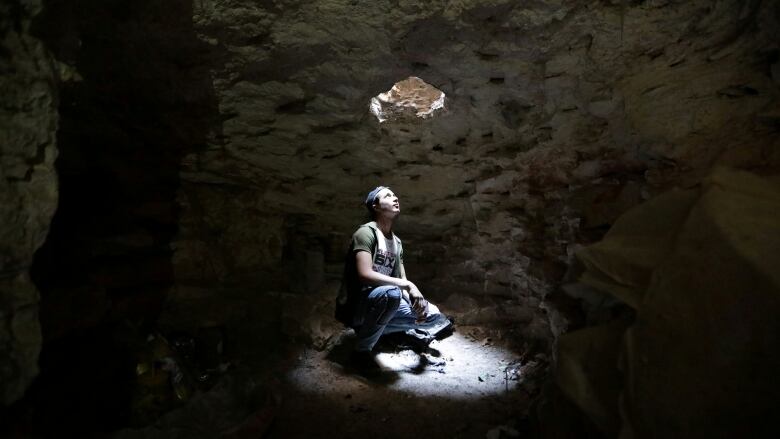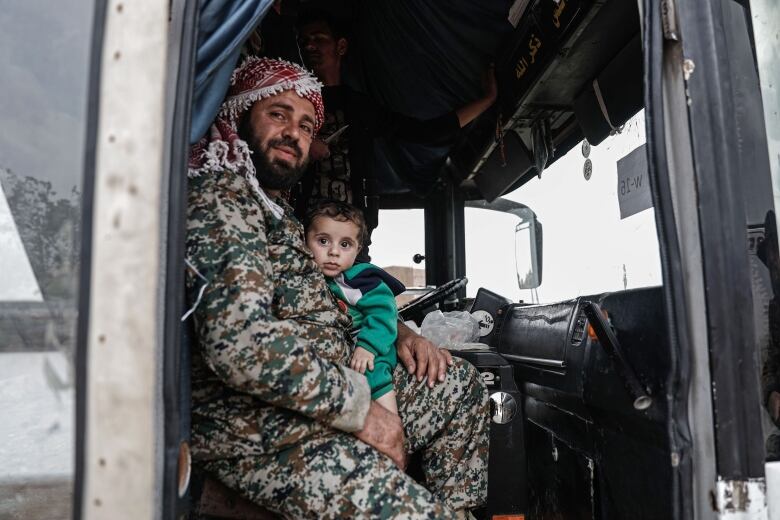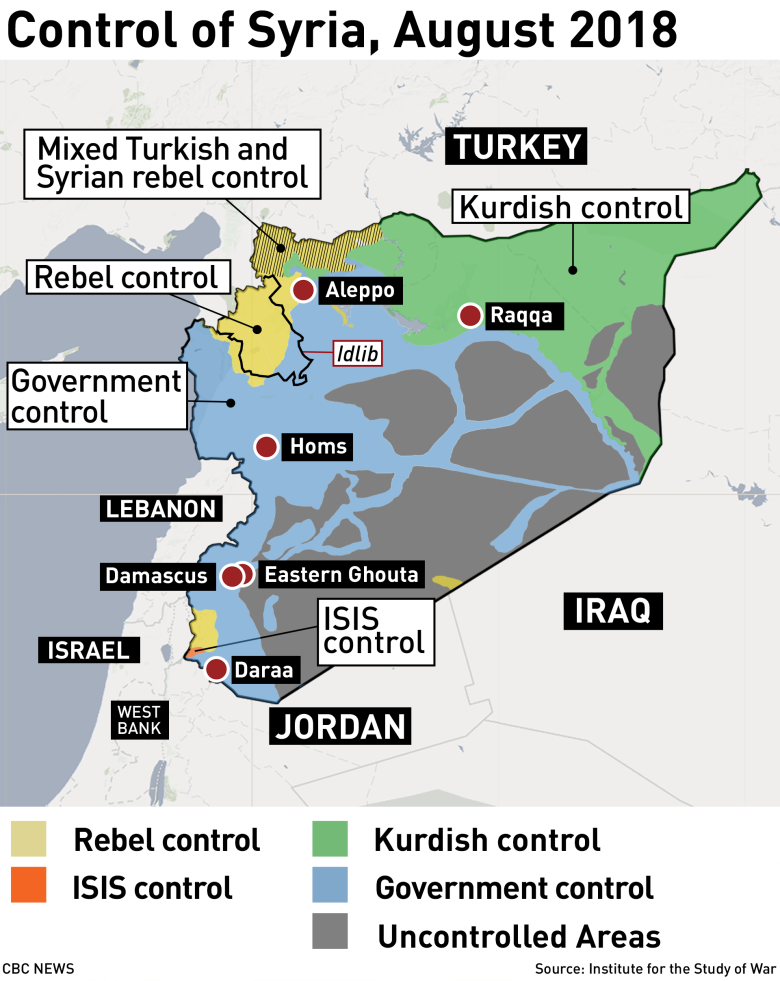Idlib explained: Why war looms large over Syria's last rebel stronghold
If a major offensive is launched, aid agencies warn of a 'humanitarian catastrophe' in area home to 3 million

Alarm bells are sounding as Syria and its Russian backers gear up for what many believe will be an all-out assault on the rebel-held province of Idlib, in the country's northwest.
Residents intheenclaveSyria's last major rebel-held territoryhave taken to the streets to ask for international intervention. There are grave fears for Idlib's civilian population, mixed in, as it is in some parts, with rebel groups.
Aid agencies say an assault could spark a humanitarian crisis yet unseen in the seven-year-old civil war.
Here's a look at the situation in Idlib.
Why is Idlib so important now?
Idlib has essentially become a giant holding pen for remaining Syrian opposition fighters in the years since Russia's military intervention on behalf of Assad back in 2015.
What followed was a brutal, but patterned, approach that saw major rebel strongholds in other parts of the country destroyed one by one: Homs, Aleppo, Eastern Ghouta, Daraa.
Enclaves were besieged, starved and bombed before the defeated rebels and their families were offered a one-way ticket out: surrender and a bus ride to another rebel-held territory of their choice.
Most wound up in Idlib.

As such, it represents a tantalizing and potentially definitive prize for Assad as he seeks to fulfil his long-held pledge to take back "every inch" of Syria from rebel hands.
But Idlib province is home to nearly 3 million people, one-third of them already displaced from other parts of Syria.
If Syria proceeds with a major offensive, as it is threatening to do with Moscow's help, aid agencies warn of a "humanitarian catastrophe" not yet seen during the seven-year-old civil war.
Syria and Russia say Idlib is a "nest of terrorists" that must be destroyed.
Is an offensive inevitable?
At a summit in Tehran on Friday, Turkish President Recep Tayyip Erdogan appealed to Syria and Russia's other major backer, Iran, to prevent Idlib from becoming a "lake of blood."
He got nowhere.
His appeals for a ceasefire were rejected by Vladimir Putin and Iran's Hassan Rouhani, who said fighting terrorism in Idlib was inevitable.

Russia has already been softening the ground. It resumed bombing targets in Idlib earlier this week after a 22-day pause a pattern reminiscent of Russian tactics ahead of the fall of Aleppo in 2016.
Syrian forces are also said to be massing along Idlib's southern borders.
How many opposition fighters are in Idlib and who are they?
The U.S. military has estimated that as many as 30,000 militants are in the region, while the Russians say that more than 70 per cent of Idlib is controlled by "terrorists."
Ascribing militants to the various groups is a complicated matter.
The most powerful and influential is widely believed to be Hayat Tahrir al-Sham (HTS), a jihadi umbrella group associated with al-Qaeda and formerly known as al-Nusra Front.

The UN's special envoy for Syria, Staffan de Mistura, has estimated there are 10,000 al-Qaeda-affiliated fighters in Idlib, including a significant number of foreigners.
Turkey is also backing a number of Idlib-based militants opposed to the Assad regime and to HTS, including some hardline Islamist groups and members of the more moderate Free Syrian Army, making its intervention in Tehran especially complicated.
Sifting out rebel groups particularly the hardcore jihadists from the civilian population will be a complicated task.
Ankara also has a number of observer bases in Idlib as part of an earlier de-escalation plan brokered with Russia and Iran.
What about Washington?
U.S. President Donald Trump has tweeted that "if it's a slaughter, the world is going to get very, very angry. And the United States is going to get very angry too."
President Bashar al-Assad of Syria must not recklessly attack Idlib Province. The Russians and Iranians would be making a grave humanitarian mistake to take part in this potential human tragedy. Hundreds of thousands of people could be killed. Dont let that happen!
—@realDonaldTrumpMore specifically, the White House has issued a statement threatening to repeat attacks on Syrian targets if lines are crossed.
"Let us be clear," the statement said. "It remains our firm stance that if President Bashar al-Assad chooses to again use chemical weapons, the United States and its allies will respond swiftly and appropriately."
In 2017, the U.S. launched a Tomahawk missile attack against a Syrian airbase near Homs after a suspected poison gas attack.
And in April of this year, the U.S., the United Kingdom and France launched more than 100 missiles in response to what they said was a chemical weapons attack on the opposition stronghold of Douma, in Eastern Ghouta.
Is there any way out for the people of Idlib?
De Mistura, the UN envoy, is urging for more time to set up humanitarian corridors for people anxious to leave the area.
With Idlib located in a northwest corner of Syria, many are afraid they'll have nowhere to go but into the arms of an unforgiving Syrian army or be pressed against a closed border with Turkey, which is fearful of another flood of refugees across its frontiers. (And maybe further beyond again, to Europe.)
An estimated 3.5 million people displaced by the violence in Syria have already sought refuge in Turkey.

It is possible that the people of Idlib may try to flee further north, to other territory jointly controlled by Turkey and some Syrian rebels.
There is also speculation that any offensive may begin in small stages, with a focus on retaking control of strategic roads.
But with many of the region's residents bracing for the worst, those who can are moving their families into bomb shelters or caves.
As de Mistura and many other seasoned Syrian watchers continue to warn, there are no more Idlib's to flee to.












_(720p).jpg)


 OFFICIAL HD MUSIC VIDEO.jpg)
.jpg)



























































































